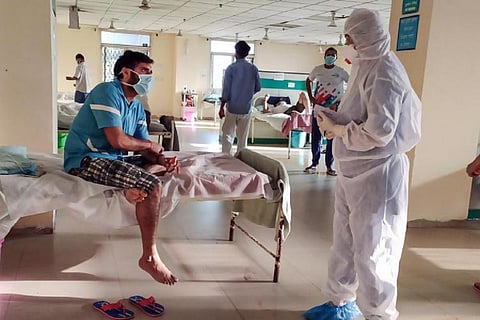

On July 19, Girish (name changed), a 32-year-old man residing in Bengaluru’s Whitefield area came to know that he has tested positive for the novel coronavirus. According to his family members, until that point when he was informed of the result, he was fine. Even when the Bruhat Bengaluru Mahanagara Palike officials — after a preliminary check up — suggested that he go to a COVID Care Centre, he insisted that he will get admitted to a private hospital so that he does not develop complications.
A family member said that even though Girish was fine and did not have any problems, he (Girish) said that he had suddenly developed breathing problems even though they could see him getting tense.
Girish is not alone. TNM spoke to multiple doctors in Bengaluru who said that many young men and women are anxious about the diseases after seeing media reports about increasing death tolls related to the pandemic.
Dr Rajani P, Deputy Director, Mental Health, Department of Health and Family Welfare, said that many patients will be anxious about what will happen if their situation deteriorates even as they are doing fine.
“Seeing what they see and hear in the media, many young people are scared. Anxiety is at the forefront for around 20-30% patients and a lot of young people fear if the infection will relapse,” she said. She said that soon after the onset of the pandemic, the government started counselling sessions for all patients in hospitals to counter the crisis. Apart from psychiatrists and psychologists attending to patients physically, more than 2.51 lakh telephonic consultations have been made across the state till July 21, she informed.
Dr Rajani said anxiety causes some patients to hyperventilate and sometimes, they will self-report breathlessness and end up in hospitals even though they are ‘completely fine’.
Dr Asima Banu, COVID-19 nodal officer at Victoria Hospital, said anxiety among patients who are doing fine on physical parameters are more prevalent among youngsters, compared to the elderly. She said even if the anxious patients are overseen by psychiatrists and psychologists as part of the treatment routine, clinicians have to address the issue to patients at an individual level.
“Fear psychosis here is a reality. The phobia only is making them feel symptomatic. Even after getting discharged or at the time of getting discharged, they will call us saying ‘cough is not going down, we are facing breathlessness’ and all. So we are forced to tell them to consult their family physicians and then they will also tell the same things,” she told TNM.
Dr Venkateshaiah, medical superintendent of the KC General Hospital, a state-run medical facility, also said the occurrence of such fears is common. He said about 20% of all patients irrespective of age or gender will need extra care on this front.
“Even though clinically we can see that their blood oxygen saturation level and all other vital statistics are fine, they need assurances from time to time. We spell it out: ‘see your oxygen rate is fine, your heartbeat is fine, your respiration is alright’. In most cases, once we tell them this, they are again psychologically elevated. The moment people think about what all they might have seen on the media or heard from somewhere, they assume that they have lost their sense of smell or have breathing difficulty even if they are completely alright,” he told TNM.
Dr Girish, psychiatrist at the KC General Hospital, said the issue common with elderly patients is of taboo and stigma. “They fear if their family, neighbours will take them back as before,” he said.
“The young people will have apprehensions such as ‘will I survive?’. So we try to reason with them with facts about how their condition is gradually improving since the time they were admitted,” he said. The psychiatrist said they would reason with the patients about how mortality rate is very low at the state or city level or how most patients are doing fine at the hospital and being discharged after a few days.
He said he advises patients not to stress too much on news and watch comedy and light content on their phones. Such patients are also asked to follow certain breathing techniques and meditate.
“We advise them not to watch news as there is too much focus on death numbers,” said Dr Girish.